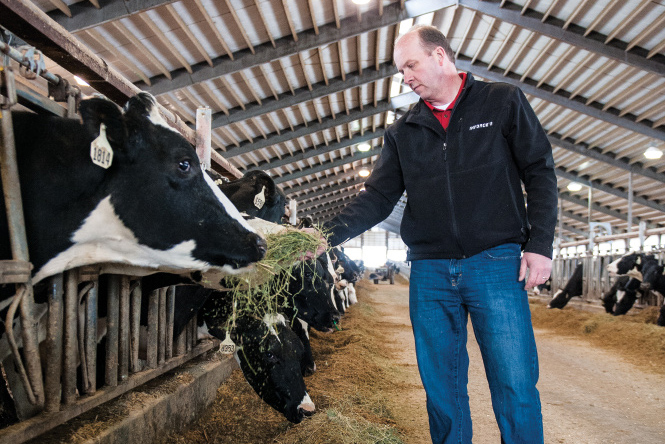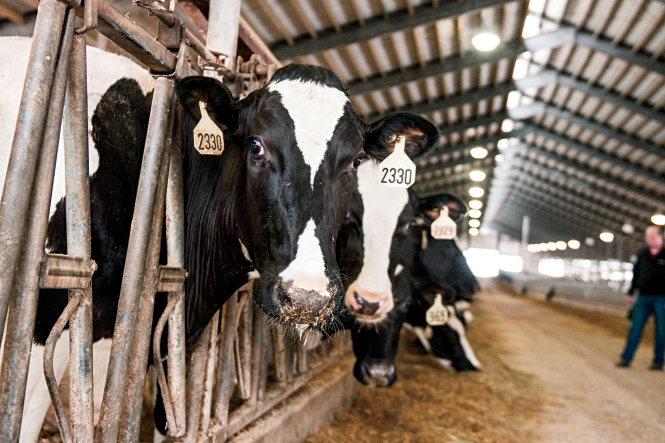Home > Wisconsin > Wisconsin Crops & Livestock > Healthy Cows, Healthy Farms
Healthy Cows, Healthy Farms
In partnership with: Wisconsin Department of Agriculture, Trade and Consumer Protection.
 Wisconsin is known nationwide for its excellence in the dairy industry. As the demand for milk continues to increase, Wisconsin dairy farmers are innovating new ways to produce more milk while still keeping animal care their top priority.
Wisconsin is known nationwide for its excellence in the dairy industry. As the demand for milk continues to increase, Wisconsin dairy farmers are innovating new ways to produce more milk while still keeping animal care their top priority.
In fact, the two go hand in hand.
“It behooves us to do everything we can 24 hours a day, seven days a week all year long to care for our animals,” says Daphne Holterman of Rosy-Lane Holsteins in Watertown. “If they’re comfortable, they grow better and are healthier. It’s also the right thing to do. Caring for animals is just innate in me. When there’s a snow storm, my first instinct is to get right out there and check on the babies.”
Holterman and her husband, Lloyd, own Rosy-Lane with two other business partners. The farm milks 900 cows, employs 20 people full time and grows much of its own feed.
Holterman says each decision the staff makes hinges on whether it will benefit the cows, and employees are trained and held accountable to nearly 80 detailed animal care standards. Each quarter, the Rosy-Lane staff formally evaluates its animal care practices and continually educates and trains its employees.
“We feel it’s very important to remind them of the best practices,” Holterman says. “You can always get better at animal care.”
Dairy Myths
General Manager Bob Nagel of Holsum Dairies, which milks over 8,000 cows in two locations, says so many of the myths about the dairy industry center around the idea that farmers push the cows too hard in an effort to increase production. Poor animal care practices do not benefit the animals or the farmers, he says.
“It benefits us to keep a cow healthy and productive for the long term rather than pushing her too hard for one lactation and then selling her,” says Nagel, who was recently named 2016 Innovative Dairy Farmer of the Year by the International Dairy Foods Association and Dairy Herd Management.
Nigel Cook, professor of food animal production medicine at the University of Wisconsin-Madison School of Veterinary Medicine, says state farmers have used good animal care practices to increase milk production safely and humanely.
“Cows are producing a lot of milk while maintaining low levels of production disease through excellent management,” Cook says. “These cows are comfortable and healthy, which means our older cows are no longer beaten up and broken down by disease.”
Another common myth consumers may believe is that cows prefer to be outside.
“Three different studies have shown that when given a choice between housing and pasture, cows actually choose both,” Cook says. “They like to be in the barn during the daytime, and they like to go outside at night. So when we ask the cows, they don’t go bolting for freedom. There are strong, powerful reasons why we house the cows the way we do.”
 Big Isn’t Bad
Big Isn’t Bad
Holterman says some people may have misinformation about large dairy farms and their ability to provide good animal care. But sometimes, she says, it’s easier to provide excellent care for animals on a larger farm because of the ability to invest in technology and superior genetics.
“I see animal care as a size- neutral issue,” she says. “We grew our farm business slowly over time, and it just so happens we are now a medium-sized family farm. We’ve found it’s about economies of scale – if you don’t have a good economy of scale, you may not be as likely to invest in technologies, some of which help you treat the cows better.”
Technology allows Rosy-Lane’s cows to receive individual care.
“They wear a Fitbit-type electronic, an Afi transponder, that communicates to a computer every eight minutes,” Holterman says. “We can track a lot of different things, and if one indicator is off a little bit, we most likely can catch an illness early.”
Being a large dairy allows Holsum Dairies to hire and keep the best talent, Nagel says. Holsum has 86 full-time employees.
“We have some very well-trained, dedicated herdsmen who are in the pens every single day getting to know these animals individually,” he says.
According to Nagel, the farm has had a herdsman on staff for 16 years who knows every cow and her history by sight.
“Having those talented people who dial in and make sure we are giving that one-on-one care on a large scale is a huge factor that helps us do well,” he says.
Cook says Wisconsin dairy farmers are some of the most hardworking, caring farmers he knows.
“I travel all over the world, and there isn’t a better group of progressive dairymen anywhere,” Cook says. “Wisconsin dairy farmers are good businessmen, and they take excellent care of their cattle.”



